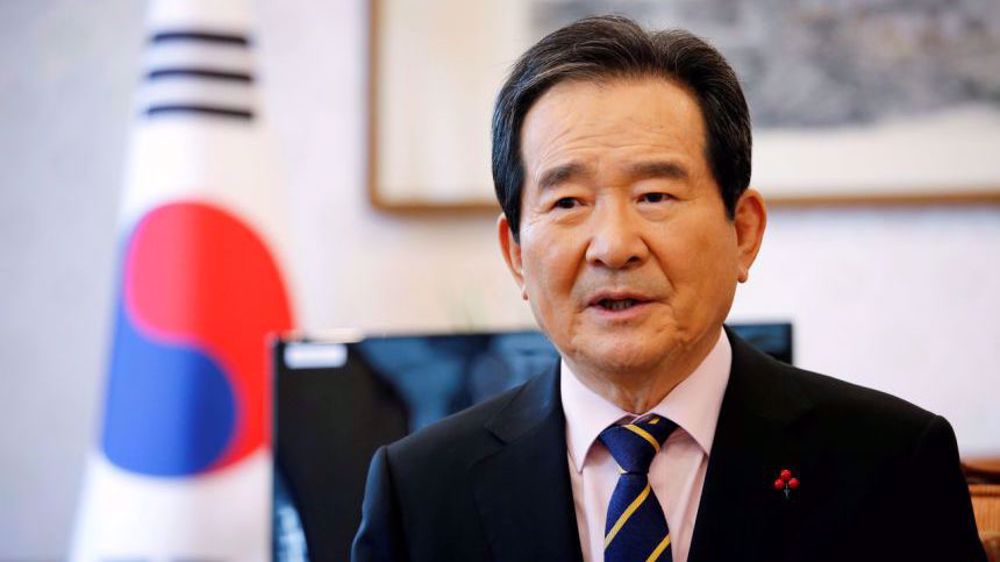South Korea’s prime minister due in Tehran to discuss frozen Iranian assets
South Korean Prime Minister Chung Sye-Kyun will pay an official visit to Tehran to discuss bilateral issues, particularly the release of billions of dollars of Iranian funds frozen in the country’s banks as a result of US sanctions.
“Chung Sye-Kyun will travel to Tehran on April 11 and 12 to meet officials of the Islamic Republic of Iran and hold talks about bilateral issues, including illegal restrictions placed in the way of access to the Central Bank’s [of Iran] resources in this country,” Iranian Foreign Ministry spokesman Saeed Khatibzadeh said on Friday.
He added that technical coordination is currently underway by the two countries’ officials to finalize the details of the visit.
Khatibzadeh said the prime minister plans to meet with Iran's First Vice President Es’haq Jahangiri, Parliament Speaker Mohammad Baqer Qalibaf and Ali Larijani, who is an advisor to Leader of the Islamic Revolution Ayatollah Seyyed Ali Khamenei.
Meanwhile, South Korea's Yonhap news agency also on Friday quoted a press release by Chung's office as confirming the visit, which is the first such trip by a South Korean premier in 44 years.
The office said, "Through this visit, Prime Minister Chung will create an opportunity to enhance traditional friendly relations between South Korea and Iran, and develop them in a future-oriented manner."
Iranian authorities have said on several occasions that they expect South Korea to do more on the release of nearly $8.5 billion blocked illegally in two South Korean banks under the pretext of US sanctions against the Islamic Republic.
Iran’s Foreign Minister Mohammad Javad Zarif said the measure taken by South Korean banks to freeze the Islamic Republic’s assets for fear of US sanctions constitute the main factor that prevents further expansion of relations between the two countries, calling on Seoul to take swift and necessary actions to settle the issue.
Speaking in a meeting with South Korea’s visiting First Vice Foreign Minister Choi Jong-kun in January, Zarif added that freezing Iran’s foreign exchange assets in Seoul is the main barrier to further development of bilateral relations.
Chung's visit to Iran follows Tehran's release of a Korean oil tanker and its captain about three months after its seizure over alleged oil pollution.
Earlier on Friday, Khatibzadeh said, “Following the completion of an investigation into the violation of the [South] Korean ship and at the request of the owner and the Korean government for the release of the ship, a release order was issued by the esteemed prosecutor.”
On January 4, the Islamic Revolution Guards Corps (IRGC)’s Navy said the South Korean-flagged MT Hankuk Chemi tanker had been detained upon a request by Iran’s Ports and Maritime Organization and a verdict by the office of Hormozgan province’s prosecutor.
Carrying 20 crew members, the ship was sailing through the Strait of Hormuz when it was impounded for causing water pollution. It was headed to the United Arab Emirates (UAE) after loading 7,200 tonnes of oil chemical products in Saudi Arabia.
'Next to impossible' to rescue patients from Gaza's Kamal Adwan Hospital: Director
VIDEO | Vietnam current prosperity
Report blames gasoil exports for shortage at Iranian power plants
VIDEO | Hind Rajab Foundation names Israeli war criminals vacationing after Gaza genocide
VIDEO | Australians rally for Gaza ahead of Christmas festivities
VIDEO | Attacks on Sana'a
Iran reports further drop in annual inflation rate in December
Israel indicts two settlers over suspected spying for Hezbollah










 This makes it easy to access the Press TV website
This makes it easy to access the Press TV website